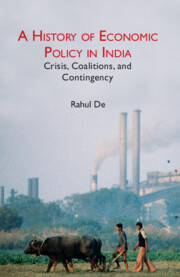Book contents
- Frontmatter
- Contents
- List of Figures and Tables
- Preface
- Acknowledgments
- List of Abbreviations
- Introduction
- 1 Colonialism and the Indian Economy
- 2 The Drive to Industrialize under Nehru's Leadership: 1950–66
- 3 The Turn to Populism under Indira Gandhi: 1967–79
- 4 The Early Liberalization Years: 1980–2003
- 5 Maturity of Reforms in the UPA Years: 2004–13
- 6 Reforms under the NDA Government: 2014–19
- Index
Introduction
Published online by Cambridge University Press: 14 September 2023
- Frontmatter
- Contents
- List of Figures and Tables
- Preface
- Acknowledgments
- List of Abbreviations
- Introduction
- 1 Colonialism and the Indian Economy
- 2 The Drive to Industrialize under Nehru's Leadership: 1950–66
- 3 The Turn to Populism under Indira Gandhi: 1967–79
- 4 The Early Liberalization Years: 1980–2003
- 5 Maturity of Reforms in the UPA Years: 2004–13
- 6 Reforms under the NDA Government: 2014–19
- Index
Summary
I was a child of reforms: I grew up in the 1990s and remember the constant delight of experiencing new things. My earliest memory of liberalization was the incursion of private cable television in Indian households in 1991 and getting access to international programming: sports, cartoons, and movies available at any time. I still have foggy memories of the 1980s when all of India would be sitting in front of the TV on Sunday mornings to watch Ramayan and Mahabharat – the previous generations were not entitled to a choice in entertainment. Choice and desire were a constant theme growing up. The personal computer arrived in households in the mid-1990s; I learned how to manipulate the keyboard and mouse to a higher degree of wizardry than any computer programmer could at that time. Then, in 1999, I visited the first multi-storey music store in Delhi: Planet M, where one could actually purchase original international albums in the same year they were released; no more illegal downloads from the internet or sneaky forays into the back alley of Pallika Bazaar – a haven of piracy located in the underbelly of central Delhi. The internet had seeped into Indian consciousness by now, and half of the country's city youth had discovered a new way of making friends and finding love hidden from the eyes of our parents. I visited my first mall in Delhi in 2002, something that I had heard about from friends who had made foreign trips. I still remember the thrill of just walking around in a shiny, air-conditioned building filled with the biggest brands that I could recognize – Nike, Adidas, McDonald’s, Crossword, Music World, Barista, and pubs. Last but not least came affordable cell phones, and before we knew it we had forgotten how people met in the times before cell phones, we had forgotten the endless arguments with our parents about using the phone all the time, and we survived many hours of boring class trying to create a new record on Snake. New things and choices were unheard of a generation ago, especially for the large part of the upper class who were dependent on a fixed income. I was constantly reminded by elders that life was very different before, they had to wait for years to get any kind of consumer durables – phone lines, cars, scooters, fridge.
- Type
- Chapter
- Information
- A History of Economic Policy in IndiaCrisis, Coalitions, and Contingency, pp. 1 - 11Publisher: Cambridge University PressPrint publication year: 2024



